| Srl | Item |
| 1 |
ID:
027753
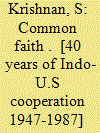

|
|
|
|
|
| Publication |
New Delhi, United States Information Service. American center., nd.
|
| Description |
176p.Hbk
|
|
|
|
|
|
|
|
|
|
|
|
Copies: C:1/I:0,R:0,Q:0
Circulation
| Accession# | Call# | Current Location | Status | Policy | Location |
| 029879 | 954/KRI 029879 | Main | On Shelf | General | |
|
|
|
|
| 2 |
ID:
158579
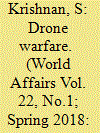

|
|
|
|
|
| Summary/Abstract |
S Krishnan details the justifi cations provided by the US for using drones even in areas where it is not formally at war and where such attacks are carried out by the CIA, a civilian agency. He avers that Washington is in breach of the laws of war, regardless of whether killing combatants by remote controlled weapons is morally acceptable and less likely to cause civilian casualties than conventional military action.
|
|
|
|
|
|
|
|
|
|
|
|
|
|
|
|
| 3 |
ID:
154422
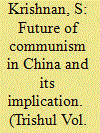

|
|
|
| 4 |
ID:
142469
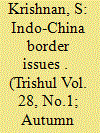

|
|
|
| 5 |
ID:
168051
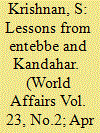

|
|
|
|
|
| Summary/Abstract |
The hostage release operations at Entebbe, Uganda in 1976 and Kandahar, Afghanistan in 1999 are studies in contrast in terms of the classic phases of hostage crises and responses of state actors. S Krishnan explores the crucial aspects of the two crises and looks for object lessons from the Israeli and Indian experiences, which evince deep differences in philosophy and capability between the two states.
|
|
|
|
|
|
|
|
|
|
|
|
|
|
|
|
| 6 |
ID:
169666
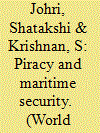

|
|
|
|
|
| Summary/Abstract |
While many people regard piracy as something daring and magical, as depicted in Hollywood movies, the reality is that piracy is a real and evergrowing threat to seafarers in many maritime arenas. One of the most important but least understood impacts of piracy is its financial cost and it is a critical maritime security threat in the world. While in ancient times, the main drivers of piracy were raiding for plunder and capture of slaves, in the modern era, economic, military, political and even technological developments have drastically altered its character. There are diverse motives behind modern day piracy ranging from economic gains through ransoms to political advantages and even terrorism. States have taken steps at the international as well as regional level to combat piracy including through legal frameworks. This paper examines the adequacy of the measures and discusses the current challenges to the implementation of anti-piracy norms.
|
|
|
|
|
|
|
|
|
|
|
|
|
|
|
|
| 7 |
ID:
173804
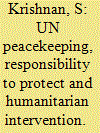

|
|
|
|
|
| Summary/Abstract |
The question of armed intervention on behalf of the international community, in the internal affairs of a state against the wishes of the government of that state, in order to prevent widespread death or suffering among the population, is not a new one. Indeed Imperial Rome grappled with the same problems in Dalmatia and Judaea 2,000 years ago, as the international community does in those same regions today. How effective are peacekeeping operations in preventing and stopping violence? Is there an alternative to United Nations (UN) and regional peacekeeping operations? The practice of UN peacekeeping is evolving in many instances into robust peacemaking actions with a positive responsibility to protect (R2P) civilians within the field of operations. The R2P (and ‘responsibility while protecting’ (RwP)) concept sets out a key principle to enable the international community to prevent atrocity crimes. Since its emergence, however, there have been intense discussions over how to put the principle into practice. Some aspects of the concept remainf unclear, including how to undertake, as the last resort, the use of military force. These issues must be considered within the boundaries set by R2P which seek at all costs to avoid the use of force for other reasons than ceasing mass atrocity crimes. The use of force, therefore – including possible military action by the international community, given growing international reluctance to accept grave threats to peace and security, including mass crimes against defenceless populations – has to be thoroughly analysed and comprehended. This article presents an analysis of the development of civilian peacekeeping, its relevance in the field of conflict resolution and its autonomy from multidimensional peacekeeping, championed by the UN.
|
|
|
|
|
|
|
|
|
|
|
|
|
|
|
|
| 8 |
ID:
143092
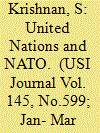

|
|
|